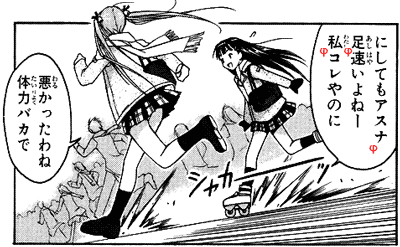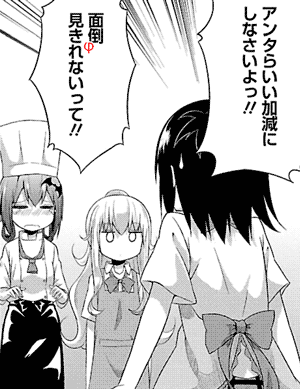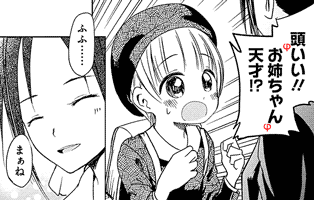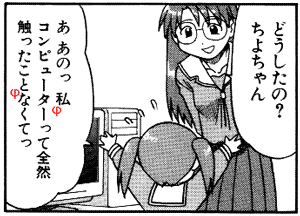For example, in kankei ga aru 関係がある, kankei is marked as the subject by the ga が particle. However, the phrase is often just: kankei aru 関係ある. Since a particle is supposed to come after kankei, but isn't there, we call that the null particle.
Symbolically, the empty set symbol ∅ or the similar-looking Greek letter phi φ is used to refer to the null particle during analysis: kankei φ aru 関係φある, the null particle φ marks kankei.
Examples
Let's start by taking a look at some examples of the null particle in action.
Manga: Mahou Sensei Negima! 魔法先生ネギま! (Chapter 1, お子ちゃま先生は魔法使い!)
- Context: a tsundere and her friend run to school.
- ni shitemo Asuna φ
にしてもアスナφ
[That said,] Asuna, - ashi φ hayai yo nee
足φ速いよねー
[You run fast, huh.]- Double subject construction.
- Asuna wa ashi ga hayai
アスナは足が速い
{Fast is true about legs} is true about Asuna.
Asuna's legs are fast.
Asuna runs fast.
[You] run [pretty] fast, huh.
- watashi φ kore ya no ni
私φコレやのに
Even though [for] me, [I] have this.- This refers to roller-skates. She's running at the same speed the other is rollerskating.
- watashi wa kore
私はこれ
(marked.)
- warukatta wa ne
悪かったわね
[Well, I'm sorry]- This is sarcasm.
- tairyoku baka de
体力バカで
For being a physical-strength baka.- i.e. for having so much stamina, endurance, agility, strength, etc.
Manga: Gabriel DropOut, ガヴリールドロップアウト (Chapter 5)
- Context: Vignette learns the harsh realities of doing group projects.
- anta-ra ii-kagen ni shinasai yo'!!
アンタらいい加減にしなさいよっ!!
You [two], stop it already!! - mendou φ mi-kirenai tte!!
面倒φ見きれないって!!
[I'm saying that] [I] can't take care of all the trouble [you two are making]!!- mendou wo miru面倒を見る
To see trouble.
To take care of trouble, or of someone who gives trouble. - ~kiru ~切る
To cut. (verb.)
To do something completely. (auxiliary, as in to take care of all trouble.) - kirenai 切れない
To not be able to cut. (negative potential.)
To not be able to do completely. - Vignette can't handle all this trouble.
- mendou wo miru面倒を見る
Grammar
Linguistically, "particle omission," or "particle ellipsis," implies there was a particle, and it's been omitted from the sentence, so it could always be put back in place without a problem.This is totally different from a "null particle," which is a whole new particle, that just happens to look exactly like an omitted particle.
Seriously.
Since it's pretty hard to tell one thing apart from the other, some linguists analyze a phrase without a particle as merely omitting a particle, while other linguists analyse it as deliberately using a different (invisible) particle because of its unique, different properties.(Shimojo, 2006)
And maybe sometimes it's one thing, sometimes it's the other thing. Who knows? I don't. So, from here on, I'll just call it the "null particle" because it's easier.
For the record, something marked by the null particle is "null-marked," or "zero-marked" if you call it a zero particle.
Orthography
Most of the time, the null particle isn't visible in writing, however, in some cases, a pause is pronounced where he particle is supposed to be, and authors may represent that pause in writing somehow.For example, sometimes there's a comma or space where the particle is supposed to be. In manga, because the speech bubbles are small, authors may simply start a new line instead of using a comma.
Syntax
The null particle can replace various other particles.The null particle often replaces the topic, which is normally marked by the wa は particle. This is specially the case if the topic is a demonstrative pronoun or personal pronoun.
- kore wa nani?
これはなに?
What is this? - kore φ nani?
これなに?
(same meaning.)
- kare wa nete-iru yo
彼は寝ているよ
He's sleeping. - kare nete-iru yo
彼寝ているよ
(same meaning.)
The null particle can also mark the subject, direct object, and indirect object.
Since the subject is generally marked as the topic in Japanese, by replacing the topic the null particle ends up replacing the subject, too.
One example of it marking the direct object:
- okashi wo taberu?
お菓子を食べる?
Will [you] eat candy? - okashi φ taberu?
お菓子φ食べる?
(same meaning.)
And the indirect object:
- gakkou ni ikanai
学校に行かない
Won't go to school. - gakkou φ ikanai
学校φ行かない
(same meaning.)
Double-Subject Constructions
The null particle is often used in double subject constructions, where there are two subjects—one large and one small—and the large subject tends to be marked as the topic, by the wa は particle, or by niwa には, while the small subject tends to be marked by the ga が particle.- Asuna wa ashi ga hayai ne
アスナは足が速いね
Asuna's legs are fast, huh.
Asuna can run quickly, huh. - Asuna φ ashi φ hayai ne
アスナφ足φ速いね
(same meaning.)
Phrases like koto aru ことある, koto nai ことない, kankei aru 関係ある, kankei nai 関係ない, something aru, something nai, frequently feature the null particle.[萩原由貴子, 2003. 話し言葉における無助詞―形式的側面を中心として― - lang.nagoya-u.ac.jp, accessed 2019-07-09]
They feature it so often that it's often more natural to say kankei aru than to say kankei ga aru. Similarly:
- ore wa {yatta} koto ga nai
俺はやったことがない
As for me, {doing} never happened.
I've never done it. - ore wa {yatta} koto φ nai
俺はやったことφない
(same meaning, more common.) - ore niwa kankei ga nai
俺には関係がない
To me, a relationship is nonexistent.
I have nothing to do with it. - ore niwa kankei φ nai
俺には関係φない
(same meaning, more common.)
Note that, generally, the first person pronoun, which would be the large subject here, is omitted altogether:
- yatta koto φ nai
やったことφない
[I've] never done it.
Manga: Kaguya-sama wa Kokurasetai ~Tensai-Tachi no Ren'ai Zunousen かぐや様は告らせたい~天才たちの恋愛頭脳戦~ (Chapter 9, かぐや様は歩きたい)
- atama φ ii!!
頭φいい!!
[Wow, you're so] smart!! - oneechan φ tensai!?
お姉ちゃんφ天才!?
[Are you] a genius, sis!?- Note: oneechan, "sister," can refer to a random teenager or young adult girl that's not actually related to you.
- oneechan wa atama ga ii
お姉ちゃんは頭がいい
{Good is true about head} is true about sister.
Sister's {head is good}.
Sister is smart. - oneechan wa tensai?
お姉ちゃんは天才?
Is sister a genius?
- fufu......
ふふ・・・・・・
*chuckle* - maa ne
まぁね
[Sort of, I guess?]
- ore φ {yatta} koto φ nai
俺φやったことφない
(also same meaning.)
Manga: Azumanga Daioh あずまんが大王 (Volume 2, Chapter May: Part 2)
- doushita no?
どうしたの?
[What happened]? - Chiyo-chan
ちよちゃん
(character name.) - a ano' watashi φ
konpyuutaa tte zenzen
sawatta koto nakute
あ あのっ 私φ コンピューターって全然 触ったことなくてっ
[Y... you see,] I've never touched a computer.- watashi wa {sawatta} koto ga nai
私は触ったことがない
I've never {touched [it]}.
- watashi wa {sawatta} koto ga nai
Nuance
The use of the null particle, or rather, the lack of an actual particle, carries with itself a nuance, or rather, a lack of a nuance.Casualty
Dropping the particles is more common in casual speech compared to formal speech.(Tsutsui, 1984, cited in Yatabe, 1999 and Shimojo, 2006)After all, dropping a particle shortens the sentence, so in a way it's akin to contractions and relaxed pronunciation. The golden rule that long sentences are formal and short sentences are casual apply even in this case.
The lack of particles implies a lack of formality.
Ambiguity
The null particle can mark the topic, subject, direct object, or indirect object. There's no way to tell which one it's marking exactly besides guessing. This lack of clear marking introduces a lot of ambiguity.Consequently, the null particle tends to be used more when it's less ambiguous. This can happen in various ways.(Fry, 2003, cited in Shimojo, 2006)
For example, in longer, more complex sentences, the ambiguity can become very troublesome, so the null particle tends to be used more with shorter sentences.
Proper nouns (names of people, places) and personal pronouns (I, you, he, they) tend to be used as the subject of sentences a lot. Consequently, even if they aren't clearly marked as the subject, it's easy to assume that they are the subject.
Monosyllabic words can be very confusing in speech if not clearly marked, so the null particle tends to be avoided with them.
In Fry's analysis, multisyllabic subjects were null-marked 34% of the time, monosyllabic, 21%. Added to that, null-marking unaccented monosyllabic nouns is less natural than null-marking accented monosyllabic nouns.(Yatabe, 1999)
- ?ka φ tonderu
蚊φ飛んでる
The mosquito is flying.- ka 蚊 is unaccented, so it's less natural to null-mark it.
- me φ itai
目φ痛い
[My] eye hurts.- me 目 is accented, so it's more likely to be null-marked.
Two Ga が
People tend to avoid using two ga が one after the other, since that would mean you have two subjects, and that doesn't make sense.Unfortunately, double subject constructions do in fact exist in Japanese, whether that makes sense or not, and therefore having two ga が, or two subjects, is somehow actually valid in Japanese.
Despite its validity, people tend to avoid having those two ga が anyway. Because life is easier that way.
The only way to end up with two ga が to begin with is if you have a double subject construction where neither large subject nor small subject is the topic. This can happen if you have a question, for example, because in a question the subject will have focus, and focus is the opposite of topic.
Observe:
- kanojo wa ashi ga hayai
彼女は足が速い
Her: legs fast are.
Her legs are fast.
She is quick on her feet.- kanojo wa - topic.
- ashi ga hayai - focus.
- ashi ga - subject.
- {ashi ga hayai} no wa dare?
足が速いのは誰?
That [which] {the legs fast are}: who?
The one [whose] {legs are fast} is who?
Whose legs are fast?
Who is quick on their feet?- ashi ga hayai no wa - topic.
- dare - focus.
- ashi ga - still the subject.
- dare ga ashi ga hayai?
誰が足が速い?
Who: legs are fast?
Whose legs are fast?
Who is quick on their feet?- dare ga - focus.
- ashi ga hayai - topic.
- ashi ga - yep, still the subject.
- dare ga ashi φ hayai?
誰が足φ速い?
(same meaning.)- dare ga - focus.
- ashi φ hayai - topic.
- ashi φ - it's the subject.
As you can see above, ashi ga hayai no wa dare? and dare ga ashi ga hayai? are synonymous. However, in the second sentence we have two ga. To avoid this, the ga が marking the small subject is omitted.
These two ga が can also be analyzed as the exhaustive-listing ga が, marking dare, and the neutral-description ga が, marking ashi.
This is important because: the exhaustive-listing ga が sounds "unnatural" if dropped.(Tsutsui, 1984, cited in Yatabe, 1999)
Exhaustive-Listing
The exhaustive-listing ga が gives focus to the word it marks, and has an exclusivity nuance. It sounds different from the usual, neutral-description ga が.Consequently, if it's missing, it'll be harder to ignore its absence because its presence exerts a greater effect on the meaning of the sentence. For example:
- ?dare φ yatta?
誰φやった?
Who did [it]?
The phrase above sounds unnatural because dare isn't marked by the exhaustive-listing ga が. How unnatural it feels varies from person to person, phrase to phrase. However, questions asked with this ga が are normally answered with the same ga が.
- dare ga yatta?
誰がやった?
Who did [it]?- dare ga - focus.
- ore ga yatta
俺がやった
I did [it].- ore ga - focus.
If someone said dare ga yatta, and someone else answered:
- ?ore φ yatta
俺φやった
(same meaning.)
It'd become very obvious that the ga が that was supposed to come after the culprit is missing from the sentence.
Neutral-Description
To make matters worse, even the neutral-description ga が can sound unnatural if dropped in topic-less, all-focus sentences.(Ono et al., 2000, cited in Shimojo, 2006)This also known as the "news" ga が, since it answers the question "what happened?" And tends to be used to express something newsworthy.
For example, in games like JRPGs, when a battle starts, you often see the following phrase show up:
- monsutaa ga arawareta!
モンスターが現れた!
A monster appeared!- (nothing) - topic.
- monsutaa ga arawareta - focus.
This is a neutral-description ga が in an all-focus sentence. It answer the question: what happened? A monster appeared! Therefore, it would be unnatural to omit the ga が particle in the situation above.
Simplicity
In a sense, the null particle is a particle that simply refers to things without adding any extra meaning. Unfortunately, because other particles can add a lot of extra meaning, this absence of effect is the null particle's nuance.As we've seen above, in "exclusive" and "newsworthy" sentences, the null particle is unnatural. Why? Because those are effects associated with the ga が particle.
The null particle lacks those effects, so using it feels unnatural because it simply doesn't sound like it does what you're trying to do with it.
On the other hand, if you use the ga が particle, in ANY sentence, it can evoke the feeling of either of those two effects. It can, also, be misinterpreted by the hearer as having either of those two effects, even when the speaker doesn't intend for it to have those effects.
As a consequence, the null particle is used instead of ga が when the speaker doesn't want the hearer to think he's trying to evoke the "exclusive" function or the "newsworthy" function in a sentence. For example:
- kore ga ii desu ne
これがいいですね
This is good, isn't it?- Exclusive effect: this thing is particularly good. It's specially good. It's great. Greatest.
- kore φ ii desu ne
これφいいですね
This is good, isn't it?- No effect.
The same thing happens with the wa は particle. It has a second function, which marks the contrastive topic, also known as the contrastive wa は, which can be implied practically anywhere.
- kore wa ii
これはいい
This is good.- Implicature: not-this is not-good: that is bad, other things are bad.
In order to avoid the implicature that may be evoked by wa は, the particle is omitted, and the topic is null-marked by the null particle.
- sore φ yabakune?
それφやばくね?
Isn't that dangerous?
Isn't that bad?
Isn't that amazing? - sore wa yabakunai?
それはやばくない?
(same meaning.)
Indeed, a lot of times, specially in manga, both particles get omitted, which kind of sucks if you're a beginner trying to figure out how the words related with each other in a sentence.
- kanojo φ atama φ ii
彼女φ頭φいい
(huh...) she... head... good? (what?) - kanojo wa atama ga ii
彼女は頭がいい
Her: head is good.
Her head is good.
She's smart.




No comments: